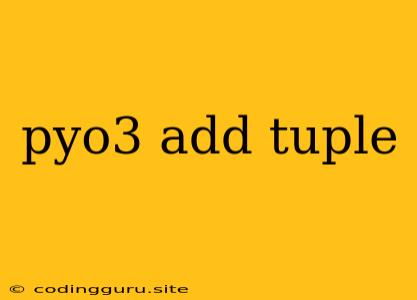Adding Tuples in Pyo3: A Comprehensive Guide
The Pyo3 library provides a seamless way to interact between Rust and Python. When working with data structures, you might encounter the need to pass a tuple from Python to your Rust code. This guide aims to shed light on how to gracefully handle tuples within your Pyo3 bindings.
What are Tuples in Python?
Tuples in Python are immutable sequences of elements. They are defined using parentheses () and can hold diverse data types, including integers, floats, strings, and even other tuples.
# A tuple with integers
numbers = (1, 2, 3)
# A tuple with different data types
mixed_tuple = ("Hello", 10, True)
Why Use Tuples in Pyo3?
When interacting with Rust through Pyo3, tuples often serve as a convenient mechanism to pass multiple values from your Python code to your Rust functions. This is particularly useful when you need to work with multiple pieces of related data.
How to Add Tuples in Pyo3?
To add tuples in Pyo3, we can leverage the power of the pyo3::prelude::PyTuple structure. Let's explore a practical example:
use pyo3::prelude::*;
#[pyfunction]
fn add_tuple_elements(py: Python, tuple: &PyTuple) -> PyResult {
// Ensure the tuple has at least two elements.
if tuple.len() < 2 {
return Err(pyo3::exceptions::PyValueError::new_err("Tuple must have at least two elements."));
}
let element1: i32 = tuple.get_item(0)?.extract()?;
let element2: i32 = tuple.get_item(1)?.extract()?;
Ok(element1 + element2)
}
#[pymodule]
fn my_module(_py: Python, m: &PyModule) -> PyResult<()> {
m.add_function(wrap_pyfunction!(add_tuple_elements, m)?)?;
Ok(())
}
Explanation:
- Import Necessary Structures: We start by importing the essential Pyo3 structures, including
prelude::*andpyo3::exceptions::PyValueError. add_tuple_elementsFunction: This function takes a PythonPyTupleas an argument and aims to add the first two elements of the tuple.- Tuple Length Check: We first check if the tuple has at least two elements, returning an error if not.
- Extract Values: We extract the first two elements from the tuple as integers using
get_item()andextract(). - Return the Sum: Finally, we calculate and return the sum of the extracted elements.
Using the Function from Python
Here's how you would use the add_tuple_elements function in a Python script:
from my_module import add_tuple_elements
result = add_tuple_elements((1, 2))
print(result) # Output: 3
result = add_tuple_elements((5, 7, 9))
print(result) # Output: 12
Key Points:
- The
get_item()method ofPyTupleretrieves an element based on its index. - The
extract()method is used to convert the retrieved element from a PyPyObject into a Rust type (in this case,i32). - The code snippet above demonstrates how to define and call a Rust function that accepts and manipulates tuples from Python.
Working with Different Data Types
The example focuses on adding integers. To handle tuples with different data types, you can adjust the extraction and processing logic within the Rust function. For instance, if you want to add strings, you would need to extract them as &str using extract::<&str>().
More Complex Tuple Manipulation
Pyo3 offers flexibility for more complex manipulations. You can iteratively access all elements of a tuple using a loop and perform various operations based on their types.
#[pyfunction]
fn process_tuple(py: Python, tuple: &PyTuple) -> PyResult<()> {
for i in 0..tuple.len() {
let item = tuple.get_item(i)?;
// Perform operations based on the type of item
if let Ok(value) = item.extract::() {
println!("Integer: {}", value);
} else if let Ok(value) = item.extract::<&str>() {
println!("String: {}", value);
} else {
println!("Unsupported type: {:?}", item);
}
}
Ok(())
}
This example demonstrates extracting elements from a tuple and handling them based on their types.
Conclusion
Pyo3 provides a powerful and flexible framework for interoperability between Rust and Python. Understanding how to work with tuples effectively is essential for building robust and efficient bindings. By leveraging the PyTuple structure and adapting extraction and processing logic, you can seamlessly pass and manipulate tuples between your Rust and Python code.
